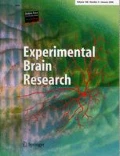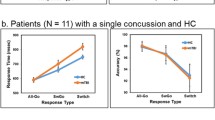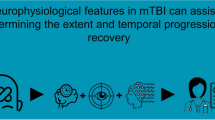Abstract.
Two dual-task experiments are reported bearing on the issue of slower processing time for severe chronic closed-head injury (CHI) patients compared to matched controls. In the first experiment, a classical psychological refractory period (PRP) paradigm was employed, in which two sequential stimuli, a pure tone and a colored dot, were presented at variable stimulus onset asynchronies (SOAs), each associated with a distinct task. The task on the tone required a speeded vocal response based on pitch, and the task on the colored dot required a speeded manual response based on color. In the second experiment, either one or three masked letters was presented, followed by a pure tone at variable SOAs. The task on the letters required a delayed report of the letters at the end of each trial. The task on the tone required an immediate manual response based on pitch. In both experiments, both CHI patients and matched controls reported an SOA-locked slowing of the speeded response to the second stimulus, a PRP effect. The PRP effect was more substantial for CHI patients than for matched controls, suggesting that a component of the slower processing time for CHI patients was related to a selective increase in temporal demands for central processing of the stimuli.
Similar content being viewed by others
Author information
Authors and Affiliations
Additional information
Electronic Publication
Rights and permissions
About this article
Cite this article
Dell'Acqua, R., Stablum, F., Galbiati, S. et al. Selective effect of closed-head injury on central resource allocation: evidence from dual-task performance. Exp Brain Res 136, 364–378 (2001). https://doi.org/10.1007/s002210000586
Received:
Accepted:
Issue Date:
DOI: https://doi.org/10.1007/s002210000586




